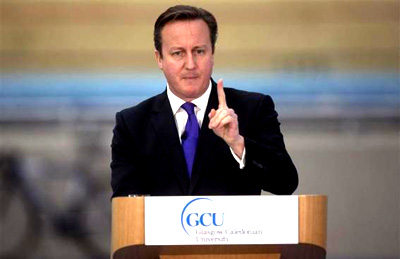
Cameron pleads Scotland to stay in UK
London, February 8, 2014
Prime Minister David Cameron made an emotional appeal on Friday for Scotland to remain part of the United Kingdom, warning Scots a vote for independence would undermine Britain's global clout and imperil its financial and political stability.
Speaking in London, Cameron, an Englishman whose Conservative party has only one of 59 UK-wide seats in Scotland, made his most passionate defence yet of the UK, which comprises England, Scotland, Wales and Northern Ireland.
"We would be deeply diminished without Scotland," Cameron told an audience in the cavernous London velodrome used for the 2012 Olympic Games, saying he would fight with all he had to hold the country he governs together.
"Together, we get a seat at the UN Security Council, real clout in Nato and Europe, and the prestige to host events like the G8. Make no mistake: we matter more as a United Kingdom - politically, militarily, diplomatically and culturally too.
If we lost Scotland, if the UK changed, we would rip the rug from under our own reputation," he added.
Scots will decide in a referendum on September 18 whether their nation, which has a population of just over 5 million and is a source of North Sea oil, should end its 307-year-old union with England and leave the UK.
Cameron said a "yes" vote would imperil Britain's stability and for ability is hugely attractive for investors. Last year, we were the top destination for foreign direct investment in Europe. That is a stamp of approval on our stability - and I would not want to jeopardise that."
It would be extremely difficult to make a currency union with an independent Scotland work, he added, casting further doubt on one of the pro-independence camp's main policy ideas.
Political analysts say a "yes" vote would place the future of Britain's Scotland-based nuclear submarine fleet in doubt and could weaken London's claim to a permanent seat on the United Nations and its influence in the European Union.
People close to Cameron say he does not want to go down in history as the prime minister who lost Scotland. But he has conceded that his privileged background and centre-right politics mean he isn't the best person to win over Scots, usually more left-wing than the English.
Polls show Scots would vote to reject independence if a vote were held today, with only around a third keen to break away from the UK. However, there are still many undecided voters and Cameron said the outcome was "up in the air".
"Centuries of history hang in the balance. A question mark hangs over the future of our United Kingdom. There can be no complacency about the result," said Cameron.
Alex Salmond, the leader of the pro-independence Scottish National Party (SNP), criticised Cameron for giving such a speech in England instead of Scotland and challenged him to debate him, something Cameron has so far refused to do.
"I don't think this is a prime minister who speaks for Britain, I don't think he speaks for England, I think he speaks for a Westminster elite who are totally and utterly out of touch," Salmond told BBC TV, accusing the prime minister of politicising the Olympics of two years ago.
"The main thing is that this is a speech delivered from London, ostensibly telling people in England what to do but actually arguing against Scottish independence instead of a debate that the prime minister must do in Scotland."
Cameron evoked the spirit of the 2012 London Olympics as an example of how the UK's four nations work well together and said Scotland already has a large measure of independence when it comes to health, education and policing matters.
Tapping into an opinion poll earlier this month which showed people in England and Wales want Scotland to stay in the UK, Cameron urged the English, Welsh and Northern Irish to tell Scots: "We want you to stay".-Reuters







